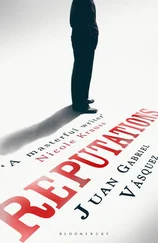Georges knew the routine by heart. Jean Moré, the host, was welcoming the hunters, and at his side was Catherine. Tradition forbade a hunter’s wife serving as a beater, but they didn’t concern themselves about that. Sitting at the dining room table, standing in the faint light coming in the window, or trying to warm up in front of the fireplace were the rest of the beaters. They had fluorescent jackets flung over their shoulders and hunting horns hanging around their necks like medallions. It was the same team as ever, except for the presence of a novice toward whom Jean was feigning tolerance.
“Gentlemen.” Jean raised his voice. “I’ll ask you to finish up your drinks and come outside. It’s time to get started. I don’t want the morning to slip away before we’ve all done what we’ve come here to do.”
“Well,” said Georges. “We’re getting under way now.”
“Go and kill lots of boars,” said Charlotte. “And bring them back to me, and I’ll cook them for you just the way you like them, and we won’t share them with anybody.”
Georges kissed her on the forehead.
“I’ll go, kill ’em, and come back,” he said. “Like in the movie.”
There wasn’t yet complete daylight in the yard. The sky was still overcast. In the inner courtyard, figures cast no shadows. On the paved surface, boots surrounded Jean with a murmur of rubber. The hunters wore green, but no green was the same as the next. Their jackets were thick fleece, adorned with yellow edges like fine epaulets and deer embroidered on the lapels, with buttons like coins on the sleeves and deep pockets in which nothing jangled, no keys, no matches, because those were garments for the hunting season, and no daily or habitual objects, nothing betraying domestic life, would ever be forgotten in their pockets.
“The circle, gentlemen,” said Jean.
The hunters surrounded him. Jean gave out the orders of the hunt speaking with his trumpet in one hand and a lit cigar in the other. Jean was one of the most respected hunters in the Ardennes, as his father had been, and Georges still felt moved at seeing the son of his best friend acting as maître de chasse .
“I have little to tell you, gentlemen, because you all know the rules. No shotguns, rifles only. Do not fire into the encirclement or toward rocks. The first boar is off-limits, as are females, roe deer, and stags.”
He kept quiet for a few seconds, as if looking for a way to round off his speech. After a moment, he let his cigar get soaked in the drizzle, took two steps toward the barbecue, and threw it in with the firewood.
“That’s it,” he said. “Good luck, and good hunting.”
The group dispersed on the other side of the gate. Each hunter seemed to have arranged beforehand which four-by-four he’d be riding in. The doors opened, the cars began to spew brightly colored supplies — red and purple plastic cylinders that looked like pieces from a children’s board game — green arms checked rifles, opened and closed portable stools, and the beaters pulled on their orange vests.
Xavier was leaning against Georges’s four-by-four. He held a black umbrella and a folding stool, the leather of which had been mended several times. Georges approached him without speaking. He patted him affectionately on the back and a cloud of dust came off his coat.
“How are you?”
“Fine. How else would I be?”
It was as if they hadn’t seen each other the night before. Georges decided to play along. He helped Xavier stow his rifle behind the backseat, with his own guns. Like several of the hunters, Georges couldn’t help bringing his old Browning shotgun on the hunt, even though he knew full well that its use would be forbidden. Balanced among the guns was a big mushroom he’d picked on the way there that fit perfectly, and wouldn’t get too knocked around along the way.
“Hope your dog doesn’t eat it,” said Georges.
Stalky, Xavier’s dog, was a golden retriever, old like his owner and tired from hunting with him for more than twelve years. An illness had damaged his sense of balance some time ago, and he walked with his head tilted to one side as if he were looking at a crooked picture.
“My dog doesn’t eat mushrooms,” said Moré.
“I know,” said Georges. “I was joking.”
“Yeah. Well, don’t make ridiculous jokes.”
They went across the Route de Modave and headed toward Aywaille, and only stopped at the north edge of the forest long enough for the beaters, sheathed in their fluorescent vests like neon scarecrows, to get out with the dogs and each take up their positions. The varied barking of the beasts and a mélange of their names filled the air. Stalky barked, too. “You’re not getting out yet,” said Xavier. “You’re staying with me.” From the other side of the grounds, a narrow track that would only allow the vehicles to proceed single file — one car behind the next, bumper to bumper — led to a field that the hunters would cross on foot on their way to their positions. The barbed wire along the edges of the track was almost grazing the doors of the four-by-fours.
“Why are they stopping?” said Xavier.
“Here comes your son.” Georges leaned out the window. “What’s going on, Jean? Why are they getting out?”
“This is where we’re going to leave the cars, Monsieur Lemoine,” said Jean Moré, who was coming along assigning positions. “Park as close as possible to the one in front, to leave space.”
“Give me the keys,” said Xavier.
“I have things to get out of the back, too,” said Georges, and then asked Jean: “Where’s my stand?”
“In front of the woods.” Jean pointed.
“Give me the keys,” said Xavier.
“Yes, yes, don’t be impatient,” said Georges, and took the keys out of the ignition and handed them to Xavier without looking at him. “And your father? Where should he go?”
“On the corner of this side.” Jean’s hand moved through the air, indicating the precise angle the trees established. “If there are any boars, these are magnificent positions.”
“They’re useless positions,” said Xavier.
“That’s not true, Papa.”
“If you were assigned that spot, you’d be offended.”
It was true, but Georges kept quiet. Being patronized this way had stopped mattering to him quite a while ago. With his dry hand he reached for an apple in the glove compartment and stuck it in his right pocket; he felt the warm contact of the fleece and his arthritis let up for an instant. Xavier, who did wear gloves, criticized him for his stubborn refusal to cover his hands on these freezing mornings. By the time Georges got out, Xavier had already unloaded all the gear they needed. Stalky was beside him, howling. Georges checked his door. Before letting go of it, he asked:
“Have you got the keys?”
“Don’t worry, you can close up. I’ve put them safely away.”
“Okay. But don’t let them jangle.”
“Don’t worry,” said Xavier, “I won’t be moving much. You’re a lucky man.”
“Nonsense, our positions are as good as each other. They’re spots for old hunters. But we are old hunters.”
“I was talking about Charlotte,” said Xavier.
His eyes had reddened and his skin was turning pale: it was almost possible to see the blood retreating from his forehead and cheeks. Two or three times in the last few years, always after too much wine, Xavier had come out with some brusque comments about Charlotte. This was the first time he’d touched on the subject while sober. Georges, however, confronted the matter with the false tolerance of someone talking to a drunk.
“No hard feelings,” he said.
“Of course not. She chose you. She stayed with you. What hard feelings could there be? Don’t be a hypocrite.”
Читать дальше










